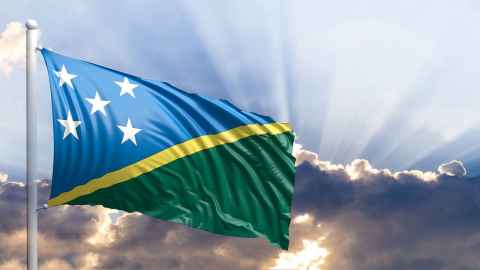Two Pacific states drop Taiwan for China
24 September 2019
Opinion: Two Pacific states have switched diplomatic allegiances from Taiwan to China, a shift with possibly wide-ranging implications writes Stephen Hoadley.

The diplomatic dealings of small Pacific islands don’t often command world attention. But recent diplomatic decisions by the governments of Solomon Islands and Kiribati may have implications in the wider Asia-Pacific and beyond. .
On September 17 the Solomon Islands formally recognised the government of the People’s Republic of China as the sole ruler of China. This entailed ‘de-recognising’ the Republic of China or Taiwan, a diplomatic partner and financial benefactor since independence in 1978. On September 20, Kiribati did the same.
These diplomatic switches are the latest episodes in an on-going rivalry between mainland China and island Taiwan, a rivalry played out not only in the Pacific region but around the world for over a half-century. Since its victory in the civil war in 1949 the Communist government in Beijing has claimed to be the sole government of China. But the Nationalist losers retreated, regrouped, and established a regime of security, prosperity and democracy on the island of Taiwan.
From that time on, the two China governments have manoeuvred against each other diplomatically, economically and occasionally militarily. Beijing has steadily gained predominance internationally. For example, it has successfully vetoed Taiwan’s membership in the United Nations General Assembly and a score of other international organisations, even non-political ones such as the World Health Organisation.
In 1972 New Zealand, joining other governments including Australia, switched recognition from Taipei to Beijing. The United States followed in 1979. In the ensuing decades Beijing progressively gained diplomatic partners at Taipei’s expense, leaving fewer than 20 small countries in the Taiwan camp, six of them Pacific islands. Now only four of those are left: Palau, Tuvalu, Nauru, and Marshall Islands.
Will the others take the road from Taipei to Beijing? The temptation is substantial. China has greater material resources than Taiwan to offer, notably aid projects, infrastructure loans and global diplomatic and trade contacts. As documented by analysts at the Lowy Institute in Sydney, in the past decade China has initiated 265 projects worth US$1.6 billion and has emerged as second only to Australia as a source of grants and loans to Pacific island countries. This trend may see China surge to the top soon.
...if China’s policies remain benign, and don’t include setting up military outposts such as it has done in the South China Sea, we can be cautiously optimistic and welcome China’s resources in a region that needs assistance.
Among Pacific rim leaders and analysts, doubts about China’s Pacific initiatives and influence are growing. These include concern about the inappropriateness and unsustainability of outsized ‘made in China’ infrastructure projects parachuted into poor tropical economies and the deepening ‘debt trap’ consequent on China’s promiscuous lending and island leaders’ undiscriminating borrowing. Further worries have emerged about China’s rumoured offer to build Navy bases in Vanuatu and Fiji. An expanding Chinese military footprint could undermine the hegemonic stability enjoyed by the Pacific region, as provided by the United States and its allies since World War II.
Australia has responded with its ‘Pacific step-up’ focused on Melanesia, and New Zealand has initiated the ‘Pacific reset’ with a Polynesian emphasis. The United States and its partners Japan, the European Union, and the Asian Development Bank are boosting aid to the islands of Micronesia.
But none has the foreign currency reserves or the global strategic aims increasingly deployed by China. It seems inevitable that the remaining diplomatic partners of Taiwan will be tempted to switch to China, attracted by ‘cheque-book diplomacy’ as well as to the glamour of association with a future superpower.
This does not spell the end of Taiwan’s influence. Taipei has proved adept at replacing lost formal diplomatic links with economic and cultural links. In Auckland and Wellington, for example, the Taipei Economic and Cultural Offices fly the flag of the Republic of China and lobby New Zealand officials, firms, and individuals to remind them of the value of keeping in contact with this democratic, prosperous and eco-friendly island of 22 million energetic inhabitants. These TECO offices, staffed by Ministry of Foreign Affairs officials, perform quasi-diplomatic functions such as pre-approving visa applications and looking after official, business, tourist, and student visitors from Taiwan. Reciprocally, New Zealand has a Commerce and Industry Office in Taipei that functions in a similar way, echoing a linkage found in capitals around the world.
So while Taipei has withdrawn its diplomats and aid experts from the Solomon Islands and Kiribati and sent home their students, one may anticipate these links will be re-established after a dignified interval. These links serve the interests of both sides, and as long as they do not include official recognition, they are tolerated by Beijing.
Pessimistic analysts worry that China is gaining undue diplomatic influence in the Pacific island region. But if China’s policies remain benign, and don’t include setting up military outposts such as it has done in the South China Sea, we can be cautiously optimistic and welcome China’s resources in a region that needs assistance.
Finally, New Zealand and other Pacific rim governments are not in a position to tell Pacific island leaders to refuse China’s aid and loans. The colonial era is over, Pacific leaders remind us, and they will make their own decisions, which include welcoming resources from China. We in the rim countries may have to adapt to an increasingly China-centred, geo-economic reality in the Pacific island region.
Stephen Hoadley is Associate Professor of Politics and International Relations in the Faculty of Arts.
This article reflects the opinion of the author and not necessarily the views of the University of Auckland.
Used with permission from Newsroom Two Pacific states drop Taiwan for China 23 September 2019.
Media queries
Alison Sims | Research Communications Editor
DDI 09 923 4953
Mob 021 249 0089
Email alison.sims@auckland.ac.nz